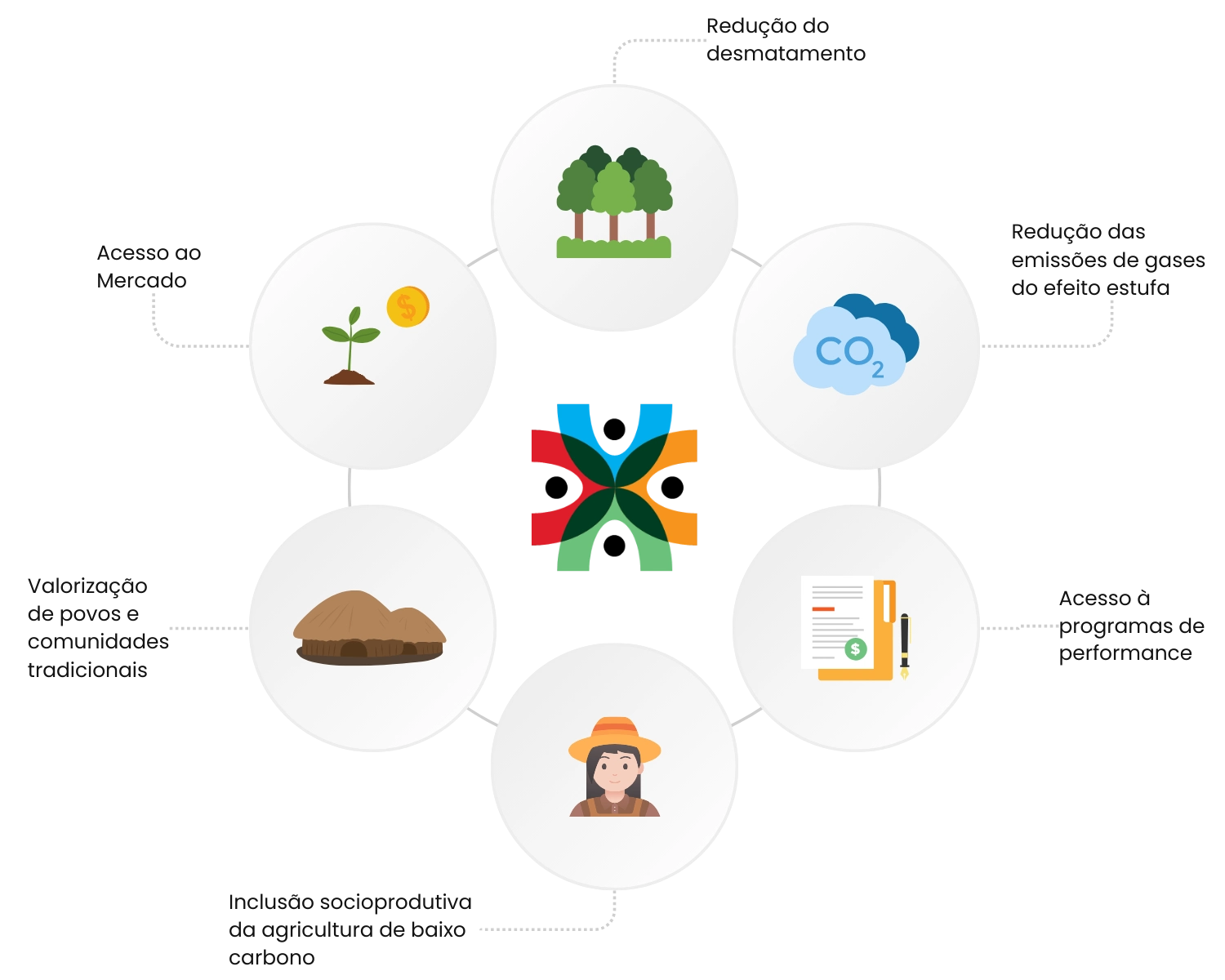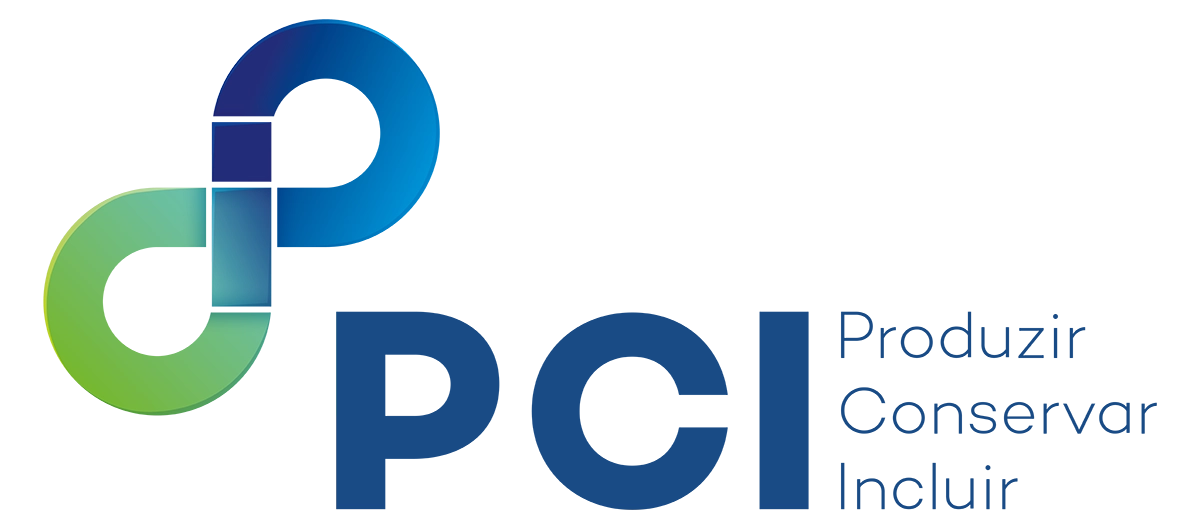REM MT
The REDD Early Movers Program (REM MT Program, in Portuguese) has been operating in Mato Grosso since 2017, after the state reduced illegal deforestation by 90% over 10 years. The program benefits those who contribute to forest conservation actions, such as family farmers, traditional communities, sustainable rural producers and indigenous peoples, and promotes initiatives that encourage low-carbon agriculture and the reduction of deforestation, in order to reduce CO2 emissions on the planet.
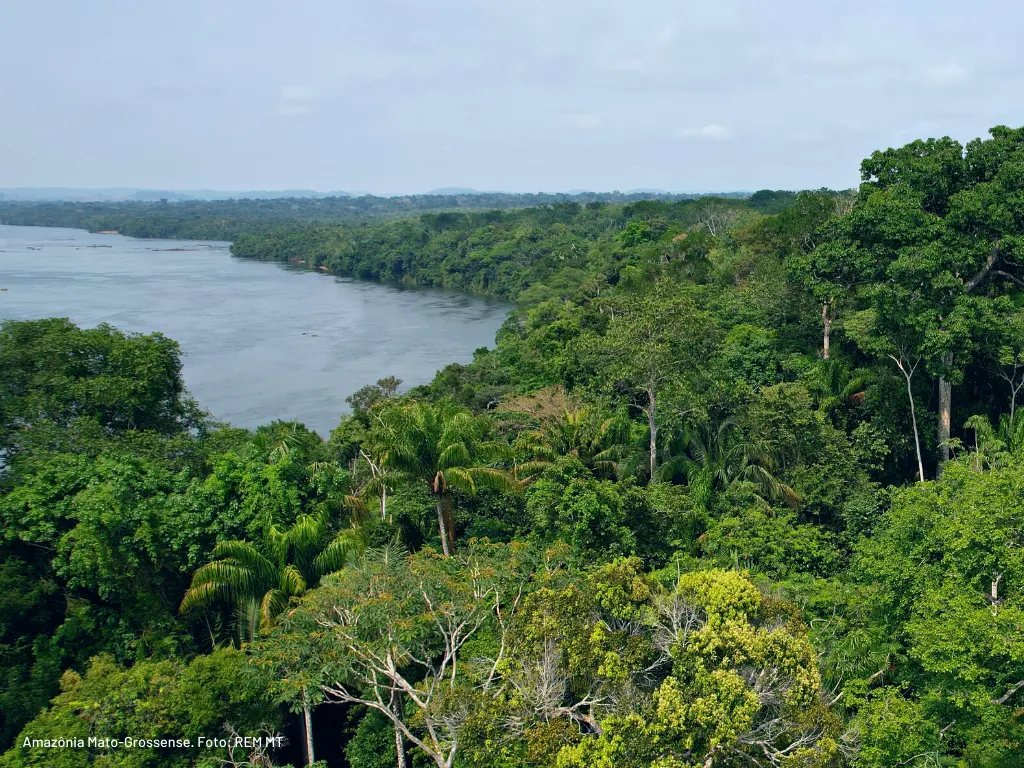
Signed by the governments of Germany and the United Kingdom, the program received, until June 2023, R$247 million reais. 4 subprograms were created: Family Agriculture and Traditional Peoples and Communities (AFPCT), Indigenous Territories (TI), Sustainable Production (PS) and Institutional Strengthening and Structuring Public Policies (FIPPE).
Na fase I do Programa REM MT, foram apoiados 155 projetos, beneficiando 131 organizações sociais, entre elas, 104 associações ou cooperativas. Os projetos abrangem os três biomas de Mato Grosso: Amazônia, Cerrado e Pantanal.
Dentre os resultados alcançados pelo programa, se destacam as mais de 500 aldeias atendidas, onde vivem 43 povos indígenas, os 108 municípios mato-grossenses beneficiados, as mais de 44 mil pessoas atendidas e os 160 mil hectares de desmatamento evitados em Mato Grosso por meio da atuação do REM MT, nos anos de 2021 e 2022.
38 million reais were invested in modernizing actions to combat illegal deforestation and integrating inspection institutions. As a result, there was a 185% increase in the number of flagrant incidents and a 400% increase in the total number of environmental fines. Furthermore, the trial time for imposing fines fell from four to two years, between June 2019 and June 2023.
The REM MT Program begins Phase 2 in the second half of 2024, with the German and UK governments guaranteeing continued investment in the state's environmental preservation. For this new phase, the UK government has invested over £15 million (R$91 million) and the German government an additional €15 million (R$80 million).
Para ver todos os resultados da Fase 1 do Programa REM MT, acesse o Relatório Executivo (clique aqui).
O REDD+ foi acordado entre as partes desde a COP 13, em Bali, 2007.
The Kyoto Protocol has been replaced by the Paris Agreement since 2015.
The Conference of the Parties (COP) invited Parties, relevant organizations and stakeholders to share results, experiences and lessons learned from their efforts to reduce emissions from deforestation and forest degradation in developing countries (REDD+).
The REDD+ Web Platform, determined by the COP in decision 2/CP.13, was created with the aim of making this information available on the results of activities related to REDD+, including training activities, demonstration activities, addressing deforestation factors and mobilization of resources.
In 2015, the Paris Agreement came into force twenty years after the creation of the Kyoto Protocol. This agreement also sets goals to reduce greenhouse gas emissions and, thus, reduce the climate problems worsened by these emissions, to which Brazil is a signatory and subnational governments contribute to its Nationally Determined Contribution (iNDC). ), through the REDD+ Payment for Results Program (PforR), financed by the REDD Early Movers Program.
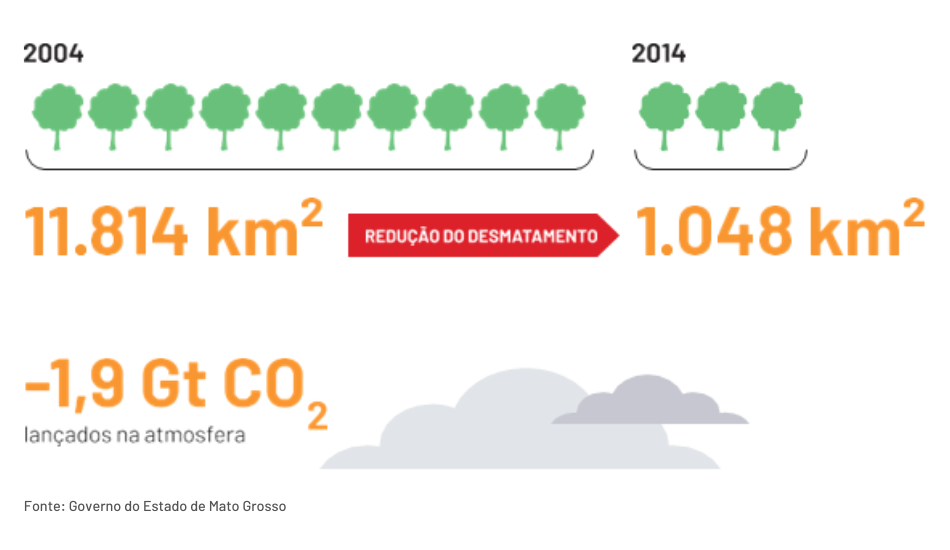
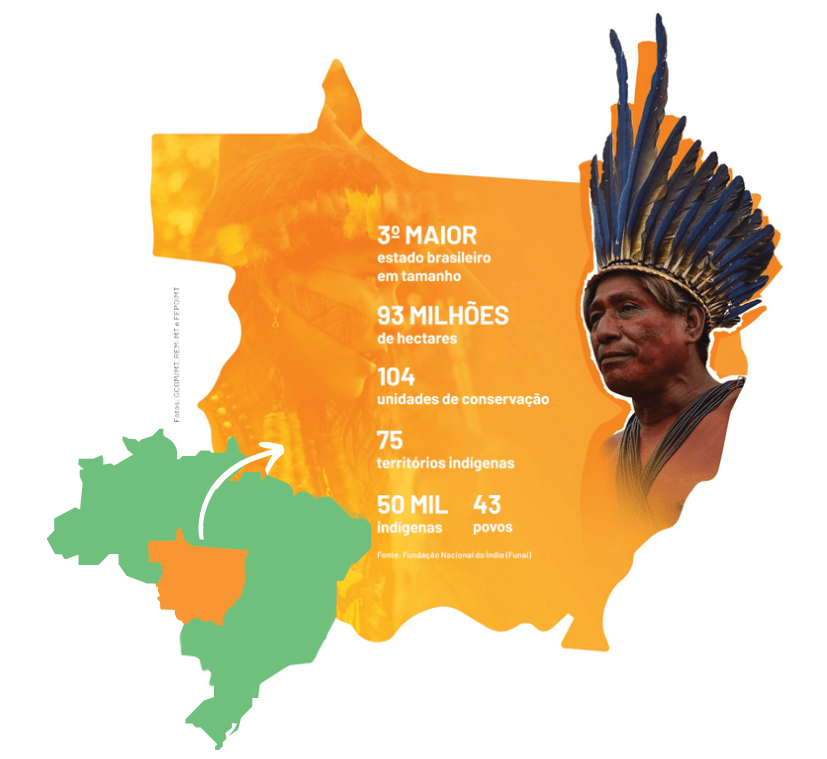
To reinforce actions to reduce global warming and give greater political strength to the goals of reducing deforestation, Mato Grosso launched, in December 2015, at COP21, held in Paris, the Produce, Conserve and Include (PCI) Strategy.
The PCI is an intersectoral strategy that aims to expand and increase the efficiency of agricultural and forestry production, the conservation of native vegetation remnants, the recomposition of liabilities and the socioeconomic inclusion of family farming, indigenous peoples and traditional populations. Currently, this strategy is being institutionalized through programs operating in the State and the creation of the PCI Institute.
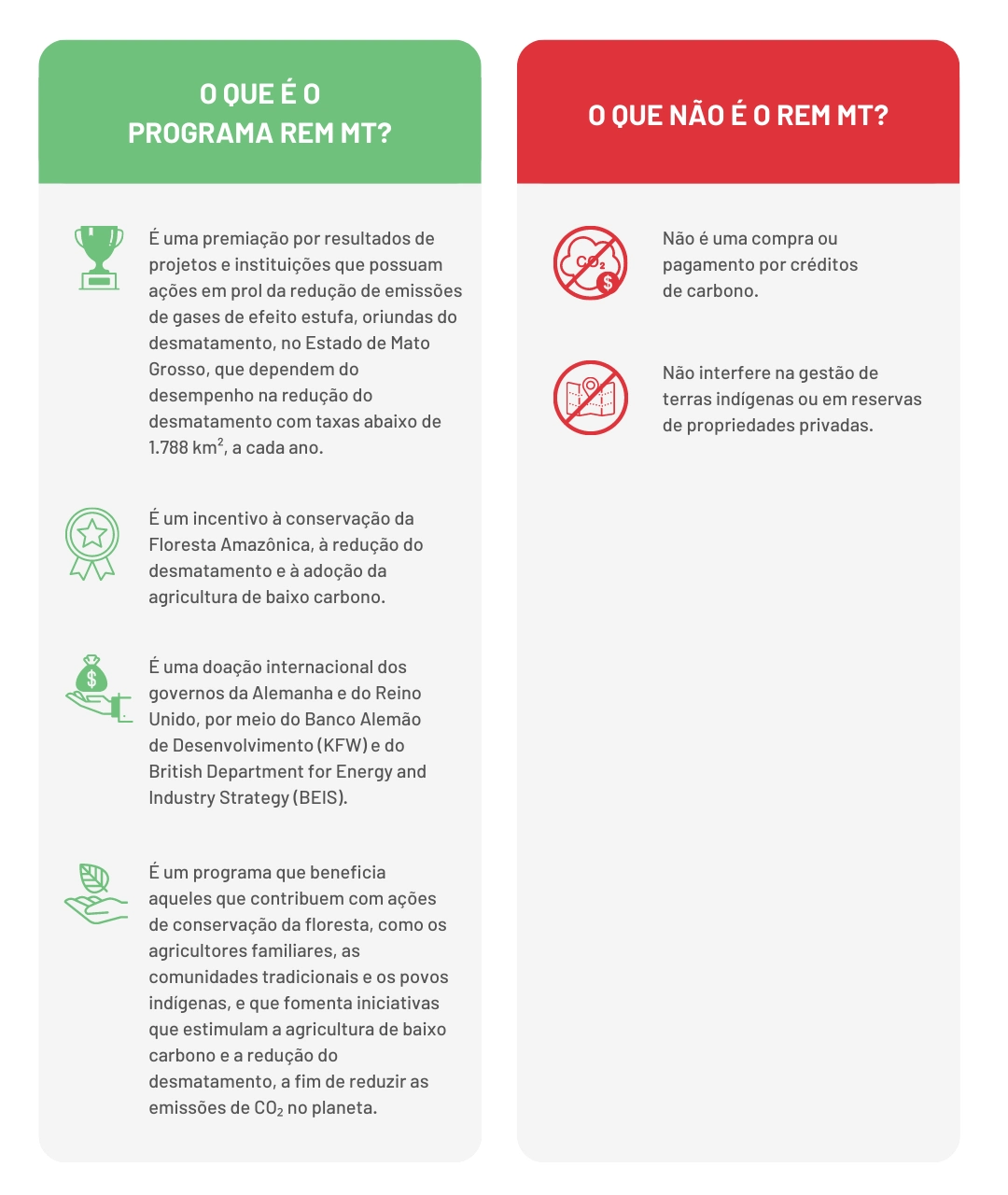


It helps to strengthen and integrate institutions that work to prevent and combat deforestation and forest fires in the State and to consolidate the REDD+ system. This structuring takes place, among other actions, through the removal of machinery used illegally in deforestation, monitoring of deforestation via satellite and the provision of daily allowances and equipment to field teams that monitor environmental offenses.
Beneficiaries: Public institutions of the State Government and the Produce, Conserve and Include (PCI) Strategy
Areas of expertise: Estado de Mato Grosso
Investments: R$ 93.883.068,55 milhões (Fase 1)

It contributes to the strengthening of indigenous organizations in Mato Grosso, including the Federation of Indigenous Peoples of Mato Grosso (FEPOIMT), as an entity representing the 43 indigenous peoples of the state, which are home to more than 40 thousand people in their territories.
Furthermore, it works to support projects that aim to strengthen the territorial and environmental management of indigenous lands, food security, income and health generation and the protagonism of indigenous women.
Beneficiaries: Aproximadamente 30 mil indígenas de 43 povos
Areas of expertise: State of Mato Grosso
Investments: R$31,149,988.98 million

Support for family farmers, traditional peoples and communities by strengthening value chains that value standing forests and encouraging agroecological and low-carbon practices, seeking socio-productive transformation and increased income generation with a focus on sustainability.
Dentre as cadeias beneficiadas, estão as do Cumbaru, Babaçu, Pequi, Castanha do Brasil, extrativismo de sementes florestais, fruticultura, palmito e apicultura, além da pecuária leiteira. Juntos, esses projetos beneficiam mais de 8 mil famílias que estão distribuídas em diferentes regiões do Estado.
Investments: R$ 85,524,823.76 million
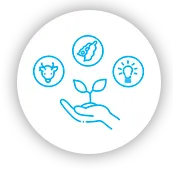
It works on projects related to sustainable livestock farming, responsible soy, sustainable timber forest management and actions related to the dissemination of good practices and technological innovation, seeking to strengthen the transformation of rural producers' production logic and making Mato Grosso's commodity chains connected with a sustainable market.
Beneficiaries: Small and medium-sized rural producers (Up to 15 fiscal modules)
Areas of expertise: Mato Grosso
Investments: R$ 23,834,786.95 million
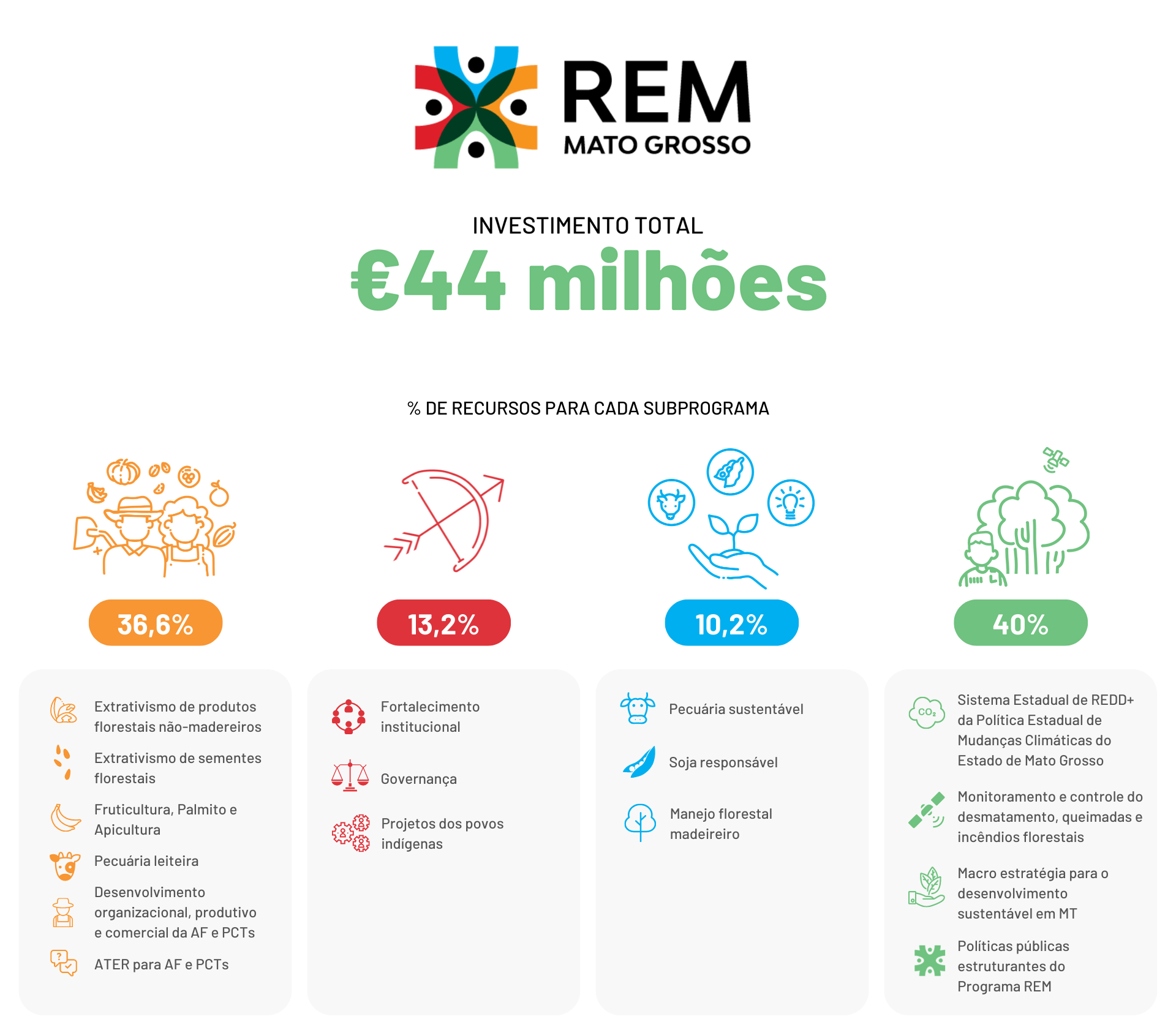

- Impacto ambiental positivo, sendo que as atividades não podem gerar novos desmatamentos;
- Impactos socioeconômicos positivos (melhoria das condições de vida dos grupos alvo, assegurando a segurança alimentar); relevância quanto à relação aos benefícios socioeconômicos e/ou redução do desmatamento no Estado, adicionais aos programas já existentes;
- Valor agregado que recursos podem trazer para o impacto e alcance das ações existentes;
- Impactos positivos em relação à equidade de gênero;
- Princípios da boa governança e da transparência no uso dos recursos;
- Prioridade geográfica (territórios críticos e prioritários), conforme áreas apresentadas na Estratégia de Repartição de Benefícios.
The REM MT Program seeks to promote the strengthening of the State's capacity to act in environmental control and promote production with low-carbon technologies, aiming at sustainable markets, supporting the restoration of forest areas and the conservation of remaining forests.
Furthermore, it acts in accordance with legal requirements, in the modernization of Technical Assistance and Rural Extension (ATER), in the leading role of grassroots organizations in traditional communities and indigenous organizations, in the socio-productive inclusion of family farming and in the valorization of socio-biodiversity products.
These actions pave the way for the State's participation in markets that value sustainability practices and give preference to products of sustainable origin, expanding opportunities for producers who choose to produce in compliance with national and international environmental standards.
With these interventions, Mato Grosso is expected to contribute to a continued reduction in deforestation and, consequently, greenhouse gases. Furthermore, it will become a State capable of receiving more resources from REDD+ Programs, contributing to investing in the transformation of this current production matrix into a matrix with low carbon emissions.
